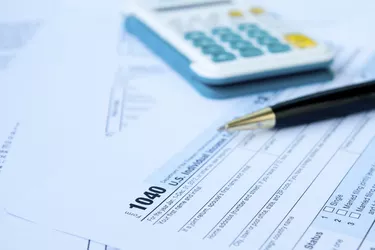
If a prior year's tax records aren't stuffed in a shoebox in your closet, they may be stacked in a box on the floor. Regardless of your filing method, you should retain each tax return for a minimum of seven years after you file it. In the event that you don't file a tax return one year or if it's likely that you made an error in your filing, you should consider retaining those records indefinitely.
What's more, it's wise to retain records related to any business, investment or real estate purchase for at least seven years following your sale of the related asset and the inclusion of that sale in a tax return. Equally important, keep your tax returns indefinitely in that each one reflects your employment, investment and charitable decisions over time.
Video of the Day
Video of the Day
Statute of Limitations
According to the IRS, a taxpayer should keep her tax returns and other tax documents for the two years following the year in which she filed the related tax return, or three years, whichever is later. The latter suggestion is based on the fact that the statute of limitations related to the conduct of audits by the IRS is three years. This rule pertains to the taxpayer who did not commit fraud, but rather reported all her income.
Some exceptions to these rules exist: Documents that pertain to worthless stocks, bad debts or instances in which you file a claim for a credit or a refund long after you file your tax return. In these cases, you should retain tax-related documents for at least seven years, which is the IRS statute of limitations for the investigation of those issues.
Additional Tax Record Retention Guidance
As stated above, federal law requires a taxpayer to retain copies of tax returns and supporting documents for a minimum of three years. The following provides some record-specific guidance:
Credit Card Statements
Some experts say a credit cardholder should keep personal credit card statements for at least 60 days. But the retention time is best determined by what the credit card is used for and whether the cardholder relies on hard copies of the statements or online statements.
Credit card statements that relate to tax filings should be requested or downloaded and retained for a period that matches that of the related tax return(s).
Home Improvement Documents
You should retain any documents that support the expenses of home improvement projects until you sell the home. One reason being is that if you are single and sell your home for an amount greater than $250,000 over the price that you paid for the home, you'll have a taxable gain.
In this case, you can reduce the amount of the gain by adding the cost of the home improvements to your original purchase price, then deduct this amount from the sales price to reduce the dollar value of the capital gain and your tax obligation regarding it.
Medical Expense Records
If you pay a medical expense with funds in a health savings or flexible spending account, you should keep your receipt(s) for a minimum of three years.
Also, keep medical bills until you have paid the bill in full. If you plan to deduct the expenses on your income tax return, keep the records a year. If you have a reoccurring condition, it may be a good idea to keep your bills indefinitely.
Another document you will receive is an explanation of benefits. You can compare your EOBs to your monthly statements to understand what you are being charged for. Unlike medical bills, EOBs should be kept from three to eight years after your procedure, or indefinitely if you have a reoccurring condition.
Investment and Real Estate Records
If you can access your investment statements online, there may be no need to save paper copies of those records. Keep in mind that most companies limit the timeframe that a customer can access those records. You can use these records to establish your cost basis when you sell an investment to ensure you claim the appropriate capital gain or loss when submitting a tax return.
Documents that Should Be Retained Forever
You should keep some documents forever in a safe location, protected from damage, theft and loss. These documents include those that will be hard or costly to replace, such as:
- Birth certificates and adoption papers
- Marriage licenses and divorce documents
- Wills
- Death certificates
- Military records
- End-of-year pay stubs
- Mortgage, student and car-loan payoff statements. If you negotiated to pay less on a debt you owed, keep the document proving you paid off that loan.